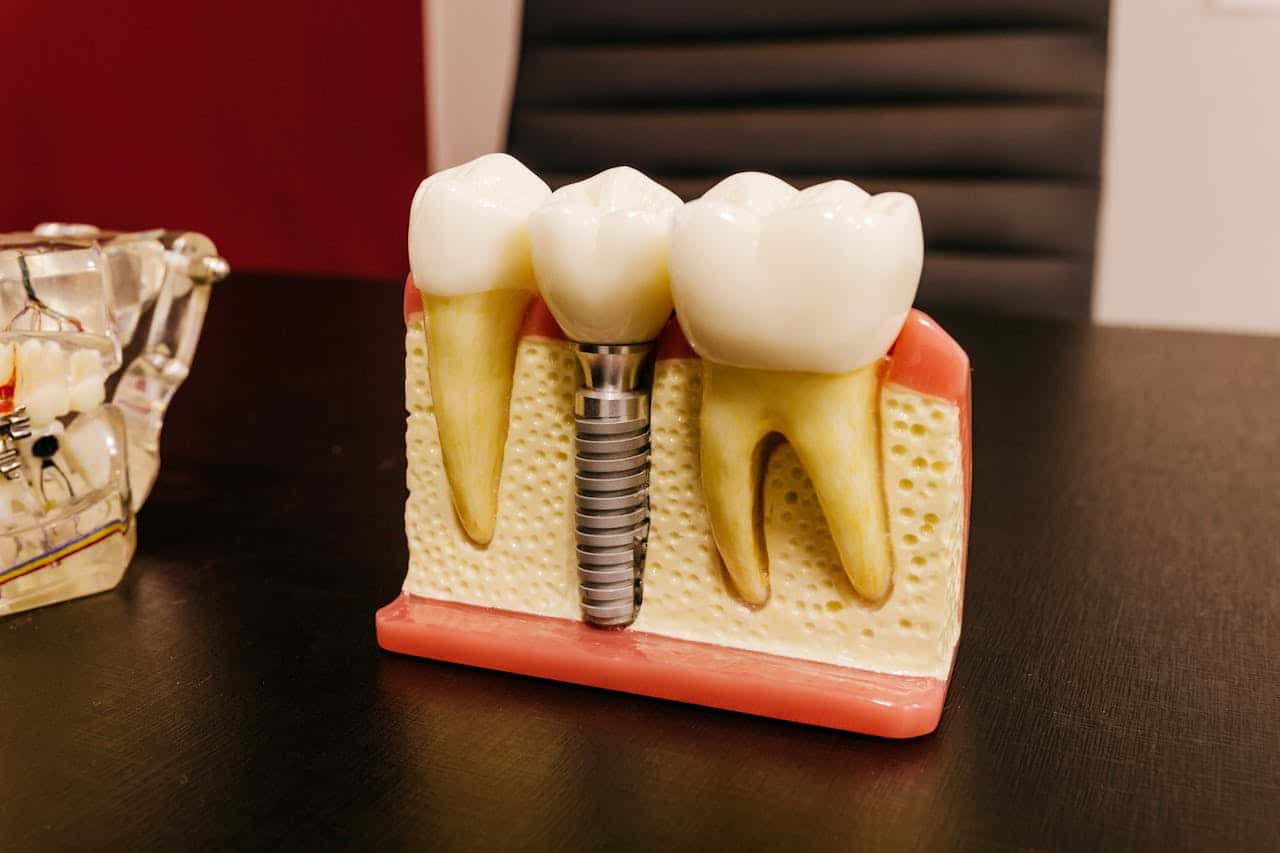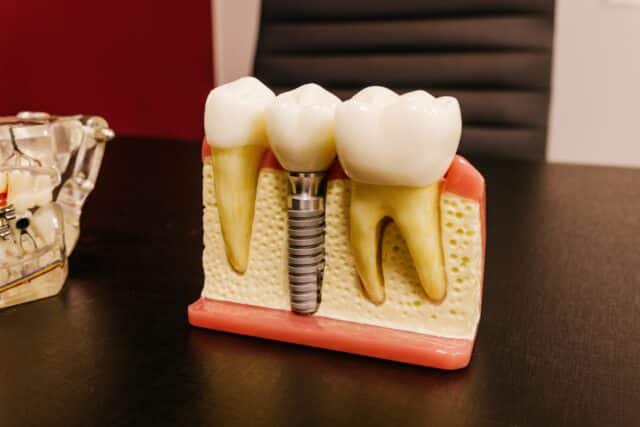
Mini dental implants are an appealing option for patients who have lost a tooth but aren’t quite ready for more traditional restoration methods. For some, conventional treatments can feel too expensive or invasive, which is why mini dental implants have become a popular alternative.
If your dentures have started to feel uncomfortable, or if you’re simply exploring better options, this newer technique might be worth considering. In this guide, we’ll walk you through everything you need to know about mini dental implants, including:
- What is a mini dental implant?
- Where are they placed, and how can they be cared for?
- What are their benefits over traditional implants?
- Who can be a good candidate for this procedure?
- How long do they last?
- What is the expected recovery time?
What Is a Mini Dental Implant?
Estimates by specialists from the American College of Prosthodontists show that over 178 million people in the U.S. have at least one tooth missing. Many of these patients have shown interest in alternative solutions when traditional dental implants aren’t a viable option.
Mini dental implants are essentially smaller versions of traditional dental implants. They consist of a one-piece screw that is less than 3 mm in diameter, making them less invasive than their conventional counterparts. This unique design allows for easier placement and makes mini dental implants suitable for patients with limited jawbone density or who prefer a less complex procedure.
Where are Mini Dental Implants Placed?
The smaller size of these implants enables their placement in narrow spaces or areas where traditional implants may not fit. This means they can be strategically placed in various areas of the mouth, making them a versatile option for many patients. They are particularly useful for stabilizing dentures or replacing single missing teeth.
Why Opt for Mini Dental Implants?
Patients might choose these smaller dental implants if they prefer less invasive procedures, which means less surgical trauma and a quicker recovery time. They can be a more cost-effective option for those who may not have the bone density required for traditional implants. Those looking for immediate results may also find mini implants appealing, as you can get a complete restoration in a single dentist’s appointment.
What are the Benefits of Mini Dental Implants?
Choosing mini dental implants offers a variety of advantages that can make them an appealing option for many. Whether you’re looking for a less invasive procedure or a more affordable solution, mini dental implants provide a range of benefits that make them stand out:
- Less Invasive Procedure: The placement of these implants typically involves a smaller incision and less trauma to the surrounding tissue.
- Reduced Healing Time: Patients often experience quicker healing than traditional implants, allowing them to return to normal activities sooner.
- Cost-Effectiveness: Mini dental implants are generally more affordable, making them accessible to more patients.
- Immediate Loading Options: In many cases, mini implants can support a restoration immediately, reducing the time needed for multiple appointments.
- Improved Stability for Dentures: They provide a secure foundation, eliminating the need for messy adhesives.
How to Care for Dental Implants?
Caring for your implants requires excellent oral hygiene. Brush twice daily and floss regularly to prevent plaque buildup. Use an antibacterial mouthwash to reduce bacteria, and make sure to schedule routine dental check-ups for professional cleanings and assessments.
Additionally, try to avoid eating hard foods that could damage your implant. If you tend to grind your teeth while sleeping, it’s a good idea to consider using a nightguard. By following these simple steps, you can help protect your implants and keep them in good shape for years to come.
Who’s a Good Candidate for Mini Dental Implants?
Note that these smaller implants may not be a suitable fit for every patient. They are ideal for patients with insufficient bone density for traditional implants and for individuals seeking a minimally invasive solution.
However, patients with active gum disease, those requiring molar replacements, or individuals with specific health conditions (like uncontrolled diabetes) may not qualify for this procedure. A thorough evaluation by a dental professional is essential to determining candidacy.
Are There Any Disadvantages to Mini Dental Implants?
While mini dental implants offer many advantages, they do come with some limitations:
- They may not provide the same level of stability in areas with little vertical bone.
- More mini implants might be required to support a bridge or denture.
- If a mini implant fails or gets damaged, it may need to be entirely removed.
Consider these downsides and discuss them with your dental professional.
How is a Mini Dental Implant Done?
The process of placing a mini dental implant is pretty straightforward. It typically involves the following steps:
- Consultation and Imaging: Your dentist will evaluate your dental and medical history, perform a physical exam, and take X-rays to determine the best placement for the implants.
- Anesthesia Administration: Local anesthesia is applied to ensure the procedure is comfortable.
- Implant Placement: A small incision is made in the gum tissue, and the mini implant is carefully inserted into the jawbone.
- Final Restoration: In many cases, the restoration (crown or denture) can be attached immediately or shortly after placement.
What’s the Recovery Like from a Mini Dental Implant?
As mentioned, one of the advantages of opting for these implants is a swift recovery. Many patients experience minimal discomfort and can return to normal activities within a few days. Following your dentist’s postoperative care instructions is essential to ensure proper healing.
How Long Do Mini Dental Implants Last?
Both mini and traditional implants are constructed from durable materials, such as titanium alloy, known for its strength and biocompatibility. While traditional implants have been studied extensively, mini implants are gaining recognition for their success, albeit with less longitudinal data available.
Mini dental implants can be a long-lasting solution when cared for properly, just like regular implants. While individual experiences may vary, good oral hygiene and regular dental check-ups can provide stable support for many years. However, patients should ensure ongoing maintenance and care, which are crucial to longevity.

Mini Dental Implants Improving a Patient’s Quality of Life
Mini dental implants represent a dependable and effective solution for those seeking tooth replacement options. One of their most significant advantages is the positive impact on your quality of life. They help reduce the hassle of traditional denture adhesives and provide a more reliable solution for tooth replacement.
Are you interested in getting a mini dental implant? Book an appointment with Archpoint Implant Dentistry today to schedule a pre-operative assessment.








